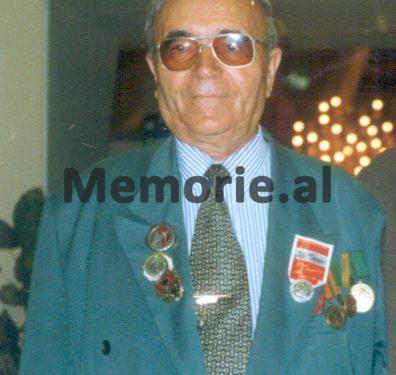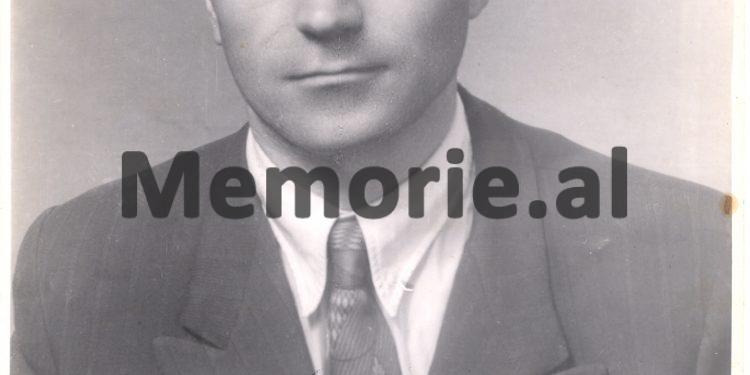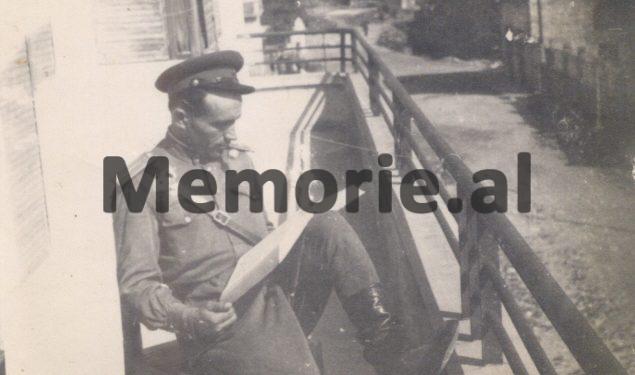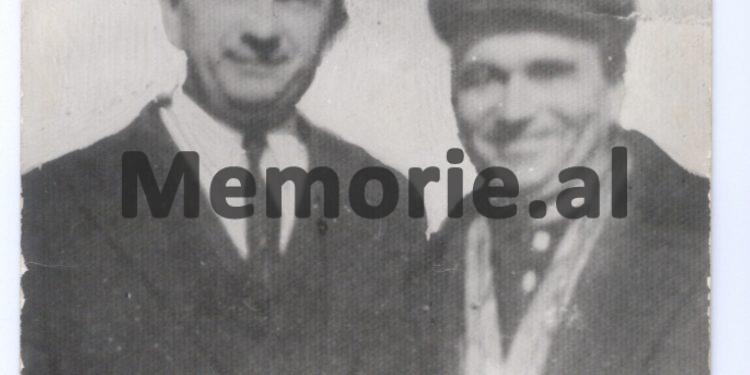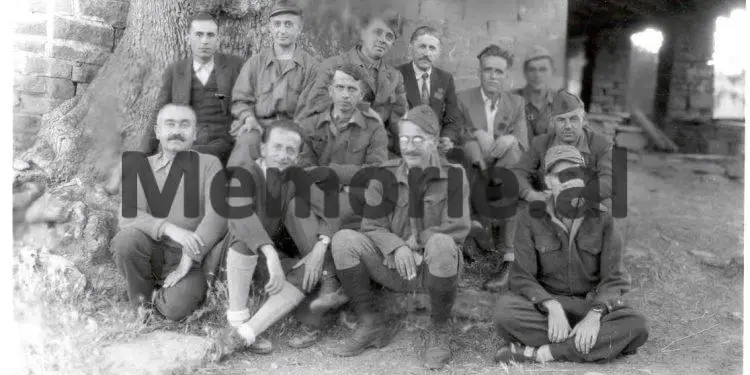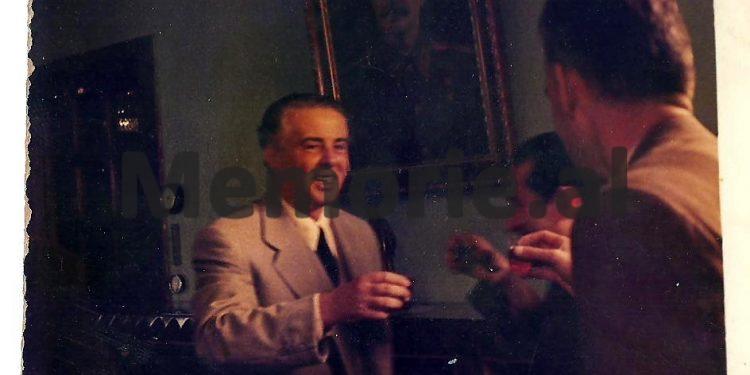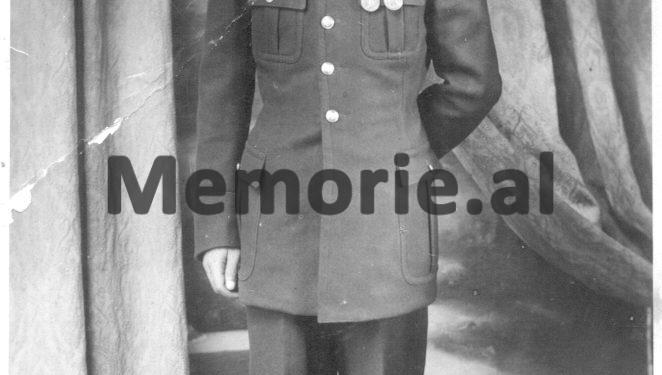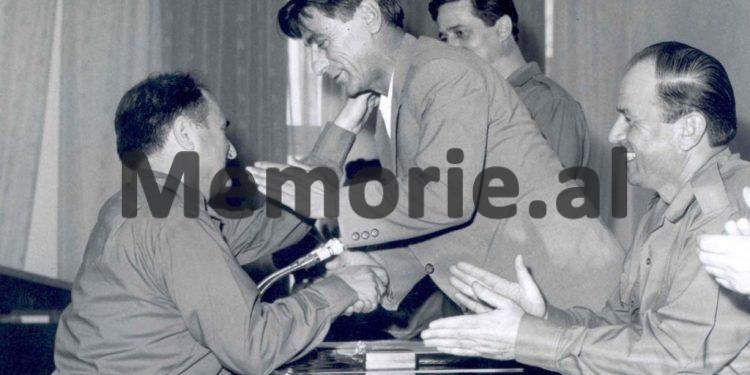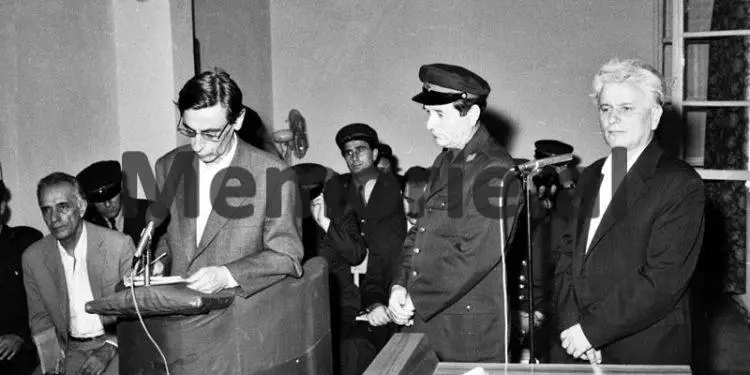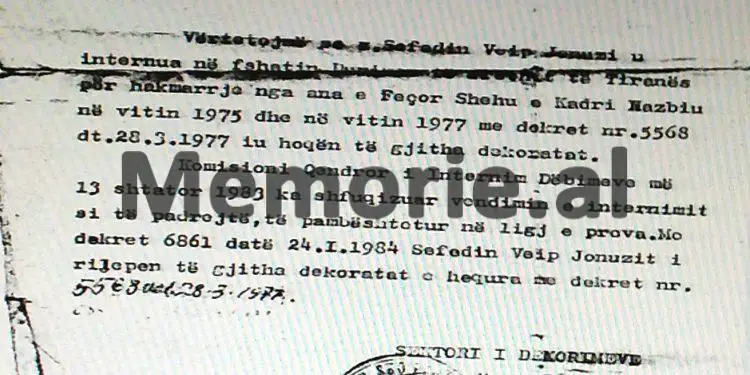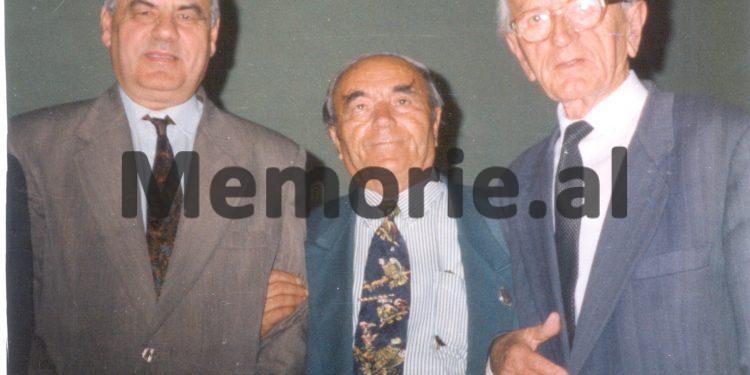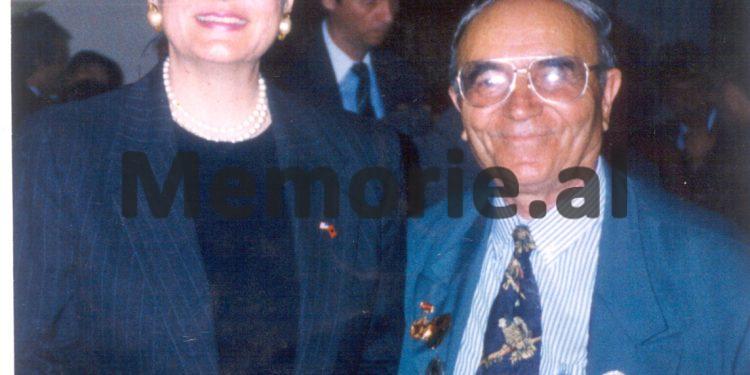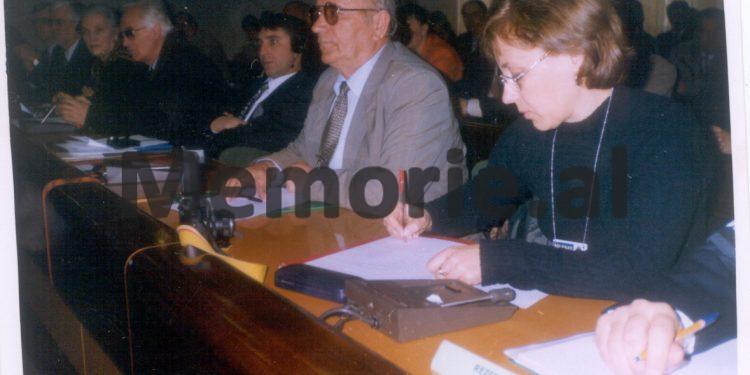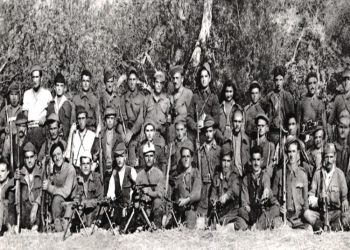Dashnor Kaloçi
Memorie.al publishes the unknown story of Sefedin Jonuzi from the village of Vranisht in Vlora, who on the recommendation of Hysni Kapos in ’44 was assigned to the General Staff, where he checked and tasted the food cooked for Enver Hoxha, which continued sometime after the end of the War near the “Commander’s family” in the Leadership Bloc in Tirana. He was then appointed to the bodies of the Ministry of Interior, with various duties, where he had many “vicissitudes” that he attempted suicide and after recovering and rehabilitating by order of Mehmet Shehu, was assigned to the Prosecution Forces in the area of Mirdita, where he took part in the arrests of “gangs” accused of killing Bardhok Biba. Sefedin’s departure from the Ministry of Internal Affairs after the “omissions” he had made during the investigation of Dom Engjell Kovaçi and being sent to Vlora to the Construction Company “Perlat Rexhepi”, where he worked until he retired in ’57 as a disabled of War. His return to Tirana and work as a butcher in a meat shop near “Bardhyl” Street where he was “activated” by the Ministry of Interior with various tasks, such as accompanying tourists and his family internment in Shëngjergj, Tirana in 1975 after the letter he wrote to Enver Hoxha on State Security. His rehabilitation in ’83, returning all the decorations and “merits” after the Prosecutor, Rrapi Mino, asked him to testify in the trial against the “enemies” Kadri Hazbiu and Feçor Shehu.
“In July 1975, when I continued to work as a butcher and I had not yet severed ties and cooperation with the bodies of the Ministry of Internal Affairs, which activated me with various services on holidays or to accompany tourists. foreigners coming as visitors to Albania, I sat down and wrote a letter to Enver Hoxha. In that 23-page letter, I asked Enver to take action and punish the Minister of Interior, Kadri Hazbiu, and his deputy, Feçor Shehu, as they had both put the Security on a dead end, using the methods of savage repression of innocent people and consistently violated the most basic human rights. A few days after that letter, I was called to the office by Nusret Dauti, who was the Director of the Directorate of Internal Affairs in Tirana, and then I had several unmasking meetings in the neighborhood and in the Party organization where I militated. After those meetings called me and accused me of “a man with high social risk and suspected of being an agent linked to the West”, in July of that year, I was interned with my family in the village of Shëngjergj in Tirana.
This was expressed, among others, by Sefedin Jonuzi, originally from the village of Vranisht in Vlora, and former personal bodyguard of Enver Hoxha during the war and later a State Security officer, who recounted all his vicissitudes while serving in those bodies, until he was interned in 1975. But who is Sefedin Jonuzi, what is his past and what did he remember from those events experienced while working for Enver Hoxha and other members of the Government? Why was Sefedini forced to commit suicide in 1946 and how did he escape death?! What were his duties at the Ministry of Interior and what missions did he carry out from the operation to arrest the people who shot at Bardhok Biba, until 1975 when he was interned after sending a letter to Enver Hoxha? Regarding these and other mysteries from his life, Sefedin Jonuzi, told them exclusively for Memorie.al that are published in the following interview.
Mr. Sefedin, who sent you to serve with Enver Hoxha and the General Staff?
At the General Staff and Enver Hoxha, I was sent on the recommendation of Hysni Kapos, who knew me very well.
What tasks does he perform at the General Staff?
After I went to the General Staff, Enver Hoxha’s personal candidate, Sterjo Gjokoreci, and the commander of the Special Company dealing with the physical security of the members of the General Staff of the National Liberation Army, Axhem Abazi, assigned me to take control of the food and the dishes consumed by Enver and the other members of the leadership who were near him at Headquarters. According to the staff regulations, for the safekeeping of leadership comrades, any food or cooking consumed by them should not be served without first checking it and without tasting it in my mouth.
How long do you serve in that position?
I served not only during the period that the Provisional Government was in Berat, but also some time after the end of the War near the family of Enver Hoxha, with the same task.
What are your impressions of Enver during your time with him?
Although I served for some time with Enver Hoxha since the time of the War, controlling the food and cooking consumed by him and other members of the Staff, as well as after the War in his home with the same task, I have never had the opportunity to meet and talk to Enver.
Why were you fired?
I did not leave this task for bad work, but that was the case then, we were military and we would go where our superiors ordered us, or as it was said then “where the party and the homeland ask us”.
Where were you assigned after you left Enver Hoxha?
After I left the service, I was doing with Enver Hoxha, I was sent as an escort to the Minister of Justice, Manol Konomi.
What impressions do you have of your former boss Konomi?
Manol Konomi was with rare virtues and he and his family, did not consider me simply as a companion, but as their brother and friend.
During that time serving with fellow leaders, did you get to know any of the other high-ranking personalities of that time?
During that time, I knew Sejfulla Malëshova very well, who at that time held the post of Minister of Press and Propaganda. Sejfullai was the human soul and the most cultured and best of all the leadership comrades I have known. He loved and respected me a lot and from time to time he called me to his room where he lived, in Hotel “Dajti”. There we both sang labçe, the songs he wrote himself. I do not know what else to say about Sejfullain, because he did not swear and everyone loved him. Sejfullai was a man of clear thoughts and knew how to orient himself with both the politics of the West and the East. Therefore, and was hit.
After serving at Manol Konomi, where were you taken?
In 1946, after serving as Manol Konomi’s entourage, I was transferred to the Youth Secretary of the People’s Defense Division, commanded by Lt. Col. Zija Kambo. I did not stay long in that Division, as I was transferred again, near the Defense Section in the city of Vlora. The Defense Section at that time was called State Security.
How long do you serve there?
In that assignment, I did not serve for a single day, because while I was waiting to start work, I committed suicide.
How and why did this happen, that you attempted suicide?
At the time I went to Vlora and was waiting to take office, there came a letter signed by Koçi Xoxe, where I was described as the nephew of the exponent of the National Front, Rrapo Mete Premtajt, (my mother’s uncle), who was nationalist and close friend of Hysni Lepenica. In the same letter that I managed to read, there was an orientation for me to be tortured and treated like everyone else, anti-party and enemy. So, in a word my physical elimination was required. After reading that letter, I was overwhelmed and went to my room to end my life. Before attempting suicide, I wrote a letter to Enver Hoxha.
What did you write in that letter?
Among other things, I wrote to him: “Being shocked by this measure, I am killing myself, because I cannot see only myself outside the Party. Do not blame anyone else for this. Long live the Party. After that I shot myself with the automatic, but I was able to escape that luckily the automatic stopped and I got only one bullet close to the heart.
What happened to you next?
After I had fallen unconscious from the bullet of the machine gun, the people of the State Security, headed by the Head of the Vlora Section, Qatip Dervishi, came to my room and took me to the hospital.
How long did you stay in the hospital?
Although the doctors had taken away my hope that I could get better and come back to life, thankfully I recovered and stayed in the hospital for no more than a month.
What was the reaction to you regarding the suicide attempt?
After I recovered and left the hospital, the senior leadership of the Party in Tirana sent a team to Vlora to verify and analyze the gesture I had made. At the head of that team came Pandi Kristo with Petraq the Magician. They asked me why I had done that act, that is, suicide, and I told him the whole truth, telling you: ‘better dead than outside the Party’. After that the decision was made and I was released from the army and expelled from the Party.
After these measures, where were you sent to work?
After that I volunteered and went to work on the Durrës-Peqin railway. Since I worked well there, I was given the right and sent to a Technical School in Yugoslavia. I stayed in that school until the Albanian-Yugoslav relations broke down and at that time I returned to Albania and asked for a meeting with the Minister of Interior Mehmet Shehu, who received me in the office because he knew me very well. After that meeting, Mehmeti ordered me to return to the army, and at that time I was assigned to the “Department 200” of the State Security. After working there for some time, I was transferred to a special company that dealt with the pursuit of saboteur gangs, where its commander was Medi Bilbili.
Have you taken part in the capture of any “saboteur gangs”?
At that time we carried out several operations to capture saboteur gangs in Northern Albania, but the most important and important at that time was the operation to capture and eliminate the people who organized and killed the First Secretary of Mirdita, Comrade Bardhok Biba, who was also elected a deputy in the People’s Assembly.
What can you tell us about the terror that took place after the murder of Bardhok Biba and how many people were arrested in connection with that event?
After the assassination of Bardhok Biba, in the first days of August 1949, the Special Company of which I was a member, undertook the task of undertaking a large-scale operation to apprehend and eliminate the persons who committed that murder. At that time, I personally arrested about 150 people, while a total of about 500 people from all over our company were arrested. But I want to say that at that time I also made many concessions, because there were people who had given bread to the saboteurs without knowing them. For those concessions I made, I had consequences, but for the sake of truth, it must be admitted that at that time they were arrested and very innocent. Since that event, for the first time I created the belief that the State Security organs were arresting innocent people and she was constantly bothering me.
What were the consequences for the omissions you made with the arrests?
At that time, I was called by the Head of Security for the Shkodra Region (on which the Mirdita district depended at the time), Major Zoi Themeli and I was under great pressure as to why I had not carried out all the orders given to me for the arrests. He said to me: “Since when have you become Minister of Interior”? After that, several meetings were held where I was criticized very harshly and as a result, they took action by removing me from that company and sent me to a State Security brigade in the district of Puka.
What kind of work did you do in Puka and how long did you stay there?
I worked in the Puka Security Brigade as an investigator and operative, but I did not stay there long, because the Security Command, on which I depended, proposed my dismissal and eventual release from the ranks of the Ministry of Internal Affairs, expelling me from the Party again…
But why were you fired from those positions and expelled from the party?
This happened because during the investigation I made of a Catholic priest, Dom Engjëll Kovaçi, who was accused of agitation and propaganda and sheltering saboteurs, I acquitted him. This caused great commotion, but I persevered to the end of my conviction that that priest had no aggravating circumstance to leave him in prison. During the investigation I conducted, Dom Engjëll Kovaçi expressed his confidence in me, telling me that religion had anti-communism as its first point, but he had not done any kind of anti-communist propaganda and was only dealing with the affairs of religion. Of course, I did not sue the desolate priest, though I had all those consequences.
But after that proposal, were you fired?
No, because the measure given to me was not accepted by the Minister of Interior, Mehmet Shehu, who called me to his office and assigned me to work in the district of Saranda. But I did not accept that transfer and stayed available for about a year, not showing up for a single day on duty. But with the departure of Mehmet as prime minister and the arrival of Kadri Hazbi in his place, I was finally fired.
After leaving the ranks of the Ministry of Interior, where did you work?
At that time, although I was fired, the Personnel branch of the Ministry of Interior sent a positive characteristic to the Central Committee and I was called by Llazi Stratobërdha, who assigned me to work in the Personnel Directorate of the Construction Company “Perlat Rexhepi” in Vlora. In that position I stayed until 1957 and at that time I returned to Tirana, retiring as a war invalid.
But after that, what did you do in Tirana?
After I returned to Tirana, I was immediately activated as an associate in the ranks of the bodies of the Ministry of Interior, leaving at my disposal all the personal weapons that I had since I was an effective officer. After that, I was found to work as a butcher in a butcher shop of the Trade Enterprise on Bardhyl Street.
How long did you work there as a butcher and what tasks did you perform during that time in the ranks of the Security organs?
I worked in that meat shop until 1975, when I was interned with my family in Shëngjergj, Tirana. While the bodies of the Ministry of Interior during all that time activated me with various tasks, mainly on holidays, but the main task I did constantly was to accompany foreign tourists who came as visitors to Albania. In that task I again had divergences with my superiors, because they asked me for reports on tourists who had come as agents in Albania. But I did not send them those reports because I had not actually found any tourists who had come for espionage purposes.
Just because you did not send reports, you were interned in Shëngjergj?
No, this was one side of the divergences I had then, but my internment came after in May 1975, I wrote a 23-page letter to Enver Hoxha.
What was this letter and what did he write to Enver?
In that long letter which I sent to Enver Hoxha by mail, I wrote, among other things: “Comrade Enver, the State Security, has no duty only to put the bars, but in the first place they must take action. prevent and save the citizens from the mistakes and guilt they can make”. This, as it were, was the essence of that letter, while I was directly accusing the Minister of Internal Affairs, Kadri Hazbiu and Feçor Shehu, (at that time he also held the post of Director of Security). I accused both of them of putting the Security on a dead end and using extreme repressive measures, which consistently violated the most basic human rights.
Specifically, what did you write about Feçor Shehu?
I wrote to Feçori that he was a very immoral and vindictive man, who artificially increased his responsibilities ostensibly in defense of the Dictatorship of the Proletariat, and for this, he had Kadri Hazbi as his shield. At the end of the letter, I demanded their punishment, because they were both discrediting not only the Ministry of Interior, but also the Party that had entrusted them with high positions.
Was it the first time you raised those issues for the two top officials of the Ministry of Interior and State Security?
I had previously presented these things to Kadri and Feçorri himself, and not only did I not receive any response from them, but they started pressuring me in order to put me in prison. This was one of the main reasons I wrote the letter to Enver Hoxha. So, I was very close to prison.
But what were the other reasons?
The main reason I made the letter at that time, was what I saw every day, that different orientations were given by the Party and differently implemented by the State Security, which in the foreground had only the terror that was exercised silently with arrests of people innocent, for things that could very well be corrected through counseling such as the orientation of the Party sanctioned this on the State Security platform approved by the Politburo long ago.
More specifically, what kind of terror was the wire letter you wrote to Enver Hoxha about?
Yes, if a person came out of a family who made mistakes or guilt, measures were taken against the whole family and the individual was not singled out. But what was the fault of the parent who had fought and worked all his life, to end up in exile, only that his son followed the fashion or left his hair long.
What happened to you after that letter you made?
Immediately after the letter I sent to Enver Hoxha, the Director of the Internal Directorate of Tirana, Nusret Dautaj, (the first cousin of Minister Kadri Hazbi Dautaj) called me to his office, who pressured me to withdraw what I had raised. in that letter and apologize, saying I was in a hurry and the Party would forgive me.
Did you withdraw?
I was determined and did not back down from what I had written in any way, whatever pressures were put on me, as I knew that my punishment after that would be certain. Punishment for punishment, I decided to stick to what I had written on paper.
What happened to you next?
After that, the Party Conference of the Ministry of Internal Affairs for Tirana took place, where I was accused and presented as “a man with high social risk and suspected as an agent of the West”.
But why “agent of the West”, where was that accusation based?
This accusation was made because I was constantly receiving packages from foreign tourists with whom I had maintained friendly and humane relations. At that conference, some senior staff of the Ministry were criticized, such as Lake Topallaj, Lirim Pëllumbi (Deputy Director of Security) Abedin Elmazi, (Tirana Police Chief), etc.
What charges were brought against them?
Because they supposedly kept me close and protected me. They were also told that: “with their work they had made me penetrate to the most cardinal problems of the State Security”. After that I was ordered to see all the archives for my work and some other unmasking meetings were held in the neighborhood and in the Party organization where I militated.
But in those meetings, what was said against you?
Although in both those meetings I was defended, Manush Myftiu rejected them calling them opportunists and after that the decision was made and I was interned with my family in the village of Shëngjergj in the Tirana Highlands.
How long did you stay in exile and how were you treated there?
Interned in the village of Shëngjergj, I stayed with my family from August 1975 until September 1983, when I was called as a witness in the trial of Kadri Hazbi and Feçorr Shehu.
Before we went to trial Kadri Hazbiu, how were you treated while you were in exile in Shëngjergj, Tirana?
When I first went to Shëngjergj, my youngest child was three years old. During all those years I stayed there, I was treated the same as all the other internees, working in agriculture with the whole family. But I want to say that I also had some facilities or help from the operative worker of the area, Ndue Frrok Gega, the son of the former Deputy Minister of Interior, Frrok Pjetër Gega. Also, I could move from there only with permission and appeared regularly on the appeal made to the internees. When I had to come to Tirana, I had to ask permission where to state where I would go and who I would meet. When my father died, Feçorr Shehu did not give me permission to go and bury him.
Why were you summoned to the trial of Kadri Hazbi and what did you testify there?
After the arrest of Kadri Hazbi and Feçor Shehu in 1982-83, at my request I presented myself to the General Prosecutor, Rrapi Mino. At that meeting, he told me: “You have been convicted in vain, without facts” and ordered the Chief of the Directorate for the Protection of Legality, Jorgo Dhrami, to deal with my problem. After he analyzed all my documents, they presented them to the Presisium of the People’s Assembly, which decided and returned to me all the rights that had been denied to me, such as the War invalidity pension and ranks, and released me from exile…
When was all this given to you, before the trial of Kadri Hazbiu, or after you testified there?
All this was given to me only in August-September 1983, after I appeared as a witness in the trial of Kadri Hazbi and Feçor Shehu, which took place inside the New Prison (ward 313).
What did you witness there for Kadri and Feçori?
As soon as I entered the courtroom, the President of the court, Aranit Çela, and the Prosecutor, Rrapi Mino, told me if I knew them both and what I had to say. I answered immediately: “I know these two as I know you. But what I had to say about these two, I told openly to the Party and Comrade Enver, at the time when they were on duty and shook the mountains. Now I have nothing to say about them. I am not taken and I do not deal with dead chickens. “If you want to know my opinion about them, read the letters I wrote then.” After that I sat down and Araniti with Rrapi Minon did not say a word to me.
What about Kadri Hazbiu and Feçori, how did they react after your speech?
Kadriu and Feçorri did not feel at all, they just lowered their heads, like wet chickens.
The Commissar of the 5th Brigade, Hysni Kapo, the man who recommended the 16-year-old partisan, “The young boy”, to serve with Enver in ’43
Sefedin Jonuzi was born in May 1927 in the village of Vranisht in the district of Vlora, where his family comes from. The Jonuzi family, or as it is otherwise known by the surname, Ramadanaj, was one of the first Vlora families that in November 1912, hosted in its house, the Elder of Vlora, Ismail Qemali. The two men of this family who received in their house the prime minister of the interim government of Vlora, were Haxhi Jonuzi and Pasho Ramadanaj. Even during the Anti-Fascist National Liberation War, the Jonuzi family, known throughout the province for its patriotic past, became closely associated with the Movement, and many of its sons joined other brigades and partisan formations. Sefedin’s father, Vehip Jonuzi, was a member of the village’s National Liberation Council, while his cousin, Hazbi Ramadani, was chairman. Also, Vehip Jonuzi took part in the War of Drashovica, against the German forces together with many other boys of his tribe. Sefedin Jonuzi himself, after finishing primary school in his native village, Vranisht, was not able to attend any other school and went to work to help his family to earn a living. Like many other members of his tribe, Sefedini, since 1943, when he was no more than 14–15 years old, joined the Anti-Fascist Movement and Maman Saliu, Jonuz Mersini and his cousin became the reason for this., Hysen Çino (“People’s Hero”). In August 1943, with the formation of the partisan gang “Sali Murati”, Sefedini joined as its partisan and since he was the youngest member of the gang, they gave him the nickname of the War “Picirruku”. In that partisan platoon, Sefedinmi was charged with the duty of its flag bearer and he remained there until the time when the partisan battalion, “Halim Xhelo Tërbaçi” was created. In that formation, Sefedin Jonuzi stayed until 1944 when the 5th Assault Brigade was formed, commanded by Shefqet Peçi and the commissioner, Hysni Kapo. In that brigade, Sefedini enlisted in the 4th Battalion and took part in all the fighting carried out by that partisan formation, where he was wounded during a battle against German forces near Mount Korab. After staying for some time in a partisan hospital in the village of Bellova in Peshkopi, he was sent to the city of Berat, where he received the necessary medication until he recovered. At that time, he was transferred to the General Staff of the National Liberation Army commanded by Major General Spiro Moisiu and Enver Hoxha, where he was assigned to the company that did the physical security of the Staff with Commander Axhem Abazi and Squadron Commander Qazim Mali. After some time that Sefedini served as a guard partisan, on the recommendation of Hysni Kapos and Enver Hoxha’s personal candidate, Sterjo Gjokoreci, together with Axhem Abazi, appointed him to control the food of the Staff and personally of Enver Hoxha. With the arrival of the General Staff in Tirana, on November 28, 1944, Sefedin Jonuzi was assigned to serve near the house of Enver Hoxha, with the same task, that of controlling the food consumed by Enver Hoxha and his family/Memorie.al




